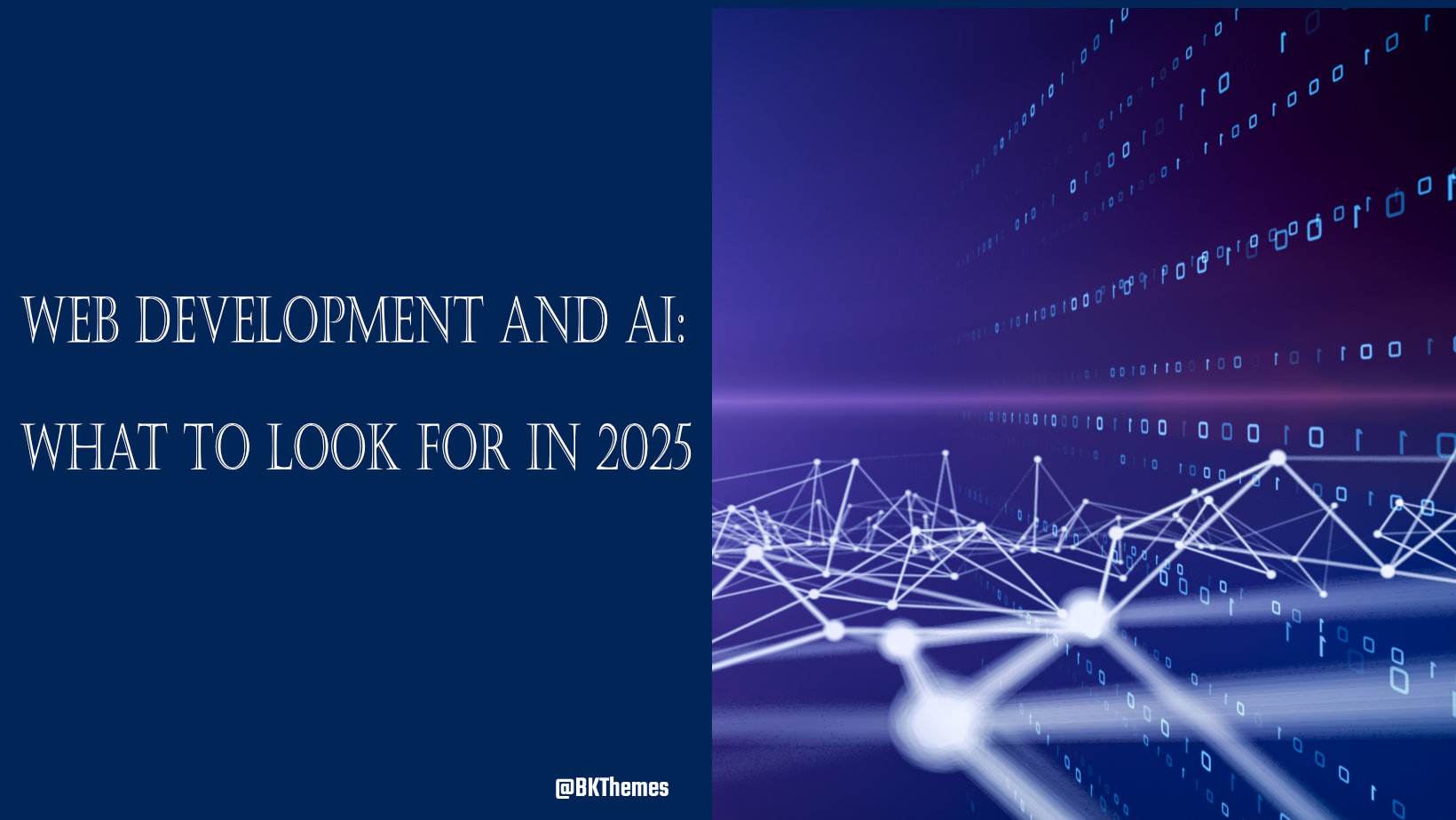
The intersection of web development and artificial intelligence (AI) is rapidly evolving, promising significant advancements in how we build, interact with, and experience the digital world. 2025 marks a crucial juncture, where the current trends will solidify and new possibilities will emerge. This article explores the key areas to watch as AI continues to reshape the web development landscape.
(https://bkthemes.design/web-design-web-development-services/) in 2025" _builder_version="4.27.3" _module_preset="default" title_level="h2" title_font="Russo One||||||||" custom_padding="||2rem||false|false" text_shadow_style="preset2" global_colors_info="{}"]
AI is no longer a futuristic concept; it's a present reality deeply influencing software development, including web development. From automating mundane tasks to generating creative content, AI tools are streamlining workflows and enhancing user experiences. In 2025, we can anticipate even more sophisticated applications, leading to faster development cycles, more personalized user interfaces, and a greater emphasis on intelligent web applications.
AI-powered tools are automating various aspects of web development, from code generation to testing and deployment. These tools can:
AI models can now analyze requirements and generate functional code snippets, reducing the time developers spend on repetitive tasks. This is particularly useful for front-end development, where boilerplate code is common. For example, tools can automatically generate responsive layouts based on predefined design specifications.
AI can identify potential bugs and vulnerabilities in code much faster than traditional testing methods. Machine learning algorithms can learn from existing test cases and automatically generate new ones, ensuring comprehensive code coverage. This leads to more robust and reliable web applications.
AI can analyze website performance data and suggest improvements to optimize loading times and resource utilization. This could involve recommending specific code optimizations or suggesting server configurations.
AI is revolutionizing the way users interact with websites. Personalized recommendations, dynamic content generation, and adaptive interfaces are becoming commonplace.
AI algorithms can analyze user behavior and preferences to provide tailored product recommendations, content suggestions, and targeted advertisements. E-commerce platforms and news websites are already leveraging this technology to enhance user engagement.
AI can generate personalized content in real-time. This could be anything from customized product descriptions to dynamically updated news feeds, tailored to individual user preferences.
AI can adapt website layouts and features based on user behavior and device characteristics. This ensures a seamless and optimized user experience across diverse platforms and devices.
AI is also impacting content creation and management, enhancing both efficiency and quality.
AI can generate articles, blog posts, social media updates, and other types of content based on specific keywords, topics, or even existing data. This is particularly valuable for businesses needing consistent content updates, such as news websites or e-commerce platforms.AI can analyze content performance data and suggest improvements to optimize SEO and user engagement. This includes suggestions for SEO" rel="dofollow">keyword optimization, better readability, and improved formatting.
AI can be used to identify and flag inappropriate content, ensuring a safe and positive online environment. This is crucial for social media platforms and forums.
AI is not just about enhancing functionality but also about bolstering security.
AI algorithms can analyze user behavior and transactions to identify and prevent fraudulent activities. This is critical for online banking, e-commerce, and other sensitive applications.
AI can detect and respond to security threats in real-time, potentially preventing or mitigating damage from cyberattacks.
As AI becomes more integrated, there's a growing need to address privacy concerns. Developing AI models that respect user privacy while still offering valuable insights is crucial.
Conversational AI, powered by natural language processing (NLP), is transforming how users interact with websites.
Advanced chatbots can provide instant support, answer user questions, and guide users through complex processes. This can improve customer service efficiency and reduce support costs.
AI-powered voice assistants are becoming more sophisticated, enabling users to interact with websites and applications through voice commands.
NLP can analyze user queries and provide personalized recommendations and support.
This AI writing tool is used by many businesses to generate various forms of content, from blog posts to marketing copy.
This tool uses AI to improve writing quality, grammar, and style, which is a valuable tool for web developers.
These algorithms constantly evolve to provide more relevant and personalized search results.
In 2025, AI will be an indispensable tool for web developers. The tools and techniques discussed above will become more sophisticated, leading to faster development cycles, more personalized user experiences, and enhanced security measures. Developers who embrace AI and adapt to these changes will be best positioned to succeed in the evolving web development landscape. However, it's crucial to address the ethical considerations and privacy concerns that arise alongside these advancements. By carefully integrating AI tools and prioritizing user experience, developers can create websites that are not only functional but also intuitive, engaging, and secure.
📧 Stay Updated
Get the latest web development tips and insights delivered to your inbox.




